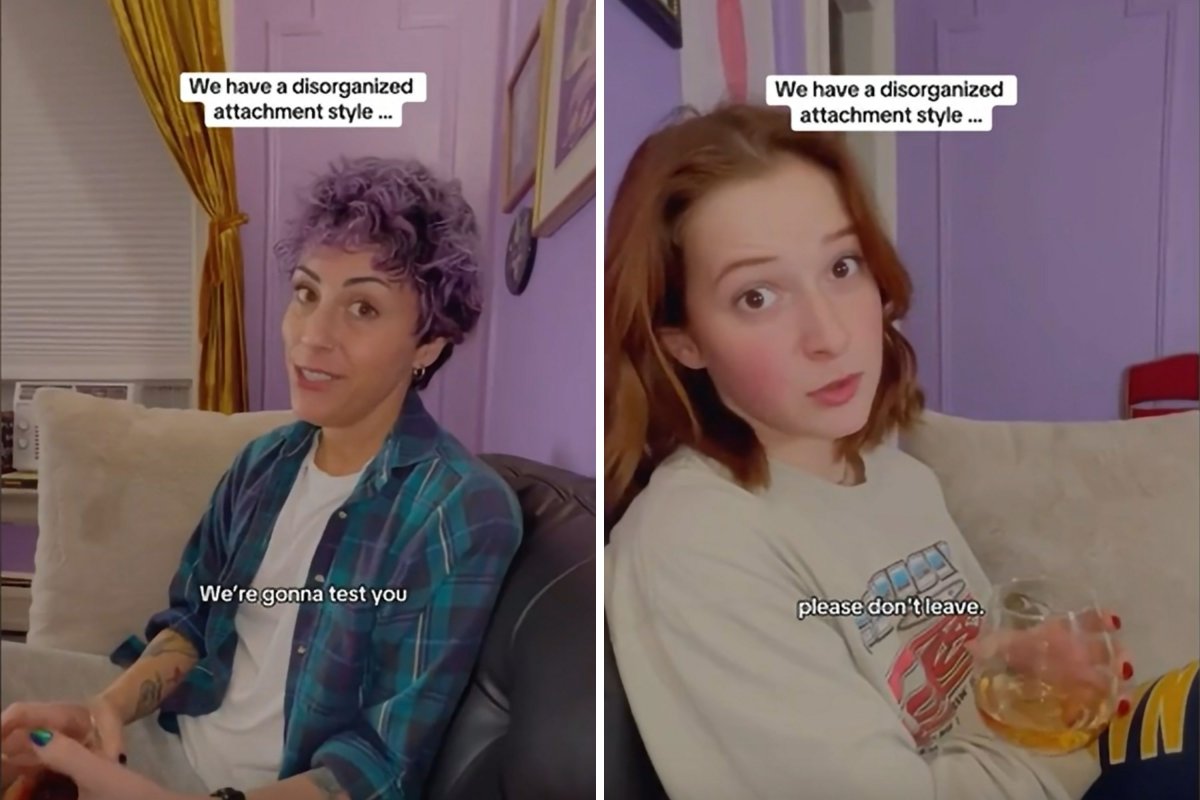Mixed signals, inconsistent behavior, conflict that goes in circles: These struggles can plague couples who want nothing more than a healthy relationship.
In the past few years, a growing awareness of different attachment styles developed in childhood has provided a framework to understand some of these issues and begin to solve them. Secure, anxious and avoidant attachment styles are those most commonly cited by the likes of online educators and therapized young people, but there is a fourth attachment style—one which can wreak havoc on relationships if left unaddressed: disorganized, or fearful-avoidant attachment.
This attachment style, according to licensed professional counselor Jessica Good, applies to significantly fewer people than the others. But its effect on relationships can be serious.
"Disorganized attachment is less popularly known because it is the least common attachment style," she told Newsweek. "This attachment style is typically born out of severe abuse or neglect in childhood...I often refer to disorganized attachment as a unique form of torment, as it entails navigating relationships akin to walking a constant tightrope, never feeling truly secure, but desperately wanting attachment."

The four attachment styles—first conceptualized by psychoanalyst John Bowlby and developmental psychologist Mary Ainsworth in the 1950s and 60s—are rooted in the way children respond to the distress of separation from their caregivers. These responses carry on into adulthood, where they eventually determine certain behaviors and attitudes towards relationships.
Securely attaching adults typically felt safe and valued by their caregivers in childhood. Conversely, those with anxious or avoidant attachment styles may have experienced inconsistencies in getting their needs met by caregivers. As a result, they grow into adults with the propensity to either cling to and seek relational approval, or to avoid intimacy and closeness altogether.
What is disorganized attachment and how is it harmful?
Disorganized attachment, also known as fearful-avoidant attachment, is the fourth type of attachment recognized in psychology. According to Rachel Goldberg, a licensed marriage and family therapist, disorganized attachment typically arises when a child experiences harm and inconsistency from a caregiver they rely on for safety and basic needs.
"For example, a caregiver might sometimes lovingly pick up their child from school, cook and eat together, and share bedtime stories," Goldberg told Newsweek. "However, on other days, the child may be picked up late by that same caregiver who has been drinking and yells at them for not being in the correct spot for pickup. Once home, the child must fend for themselves for the rest of the evening."
Goldberg explained that because the child is unable to process this paradox of reactions—especially to reconcile their dependence on the caregiver with the fear they experience—disorganized attachment develops. This oscillation can leave a child feeling both drawn to and repelled by their caregiver.
'I'm constantly seeking evidence of some inevitable hurt'
The way a disorganized attachment style can show up in adult relationships is predictable: people often fluctuate, sometimes chaotically, between clingy and avoidant behaviors. Their inconsistent behavior mirrors the inconsistent treatment they received, Goldberg said.
Allie K. Campbell, 34, makes content online about her disorganized attachment style. She spoke to Newsweek about her experience learning she had a disorganized attachment style and the impact it has had on her relationships.

"I often find myself suspicious of my partner's—or even potential partner's—intentions, even when there's no logical reason to be," she said. "It's like I'm constantly seeking evidence of some inevitable hurt...When I am dating or in a relationship, the emotions I experience are often intense, conflicting and painful."
Through self-directed research and cognitive behavioral therapy, Campbell realized she was portraying traits of both anxious and avoidant attachment styles. She eventually learned, in therapy, about the contradictory feelings present in disorganized attach-ers.
"The discovery was bittersweet, offering relief in understanding my relationship struggles, [and] sadness for the underlying causes of my attachment style," she said.
Campbell said her disorganized attachment profoundly affects her romantic life. The feelings and behaviors rooted in disorganized attachment, she said, have even led to the premature ending of a relationship at the first sign of conflict or emotional vulnerability.
"Despite the feelings of love and desire for connection, they often feel overshadowed by this debilitating fear of being used, taken advantage of, or hurt by my partner," she said.
However, Campbell believes knowledge is power: She said that knowing about her disorganized attachment style and the way it shows up in relationships helped pave the way for her healing.
@alliekcampbell When it’s two disorganized ppl it’s double the hiding and double the passive aggressively suggesting seeking therapy 😂 #DisorganizedAttachment #FearfulAvoidant #AttachmentStyles
♬ original sound - Matt Cama | Relationship Coach
Signs and stories of healing
Goldberg told Newsweek that while disorganized attachment can create major challenges in relationships, healing is possible with awareness, dedication and support. Over time, consistent care and compassion from a supportive partner can help individuals with disorganized attachment internalize feelings of trust and security, gradually strengthening intimacy and stability in relationships.
Goldberg offered some sure signs of healing:
- Having a more even keel on a daily basis and being able to remain calm when interpersonal relationship issues arise.
- Being able to have an argument with someone without using extreme verbiage or blocking them on all social media, only to later unblock them.
- Relationships become consistent, and the person becomes less impulsive and distressed.
Campbell said she has been lucky enough to experience love with a securely attached partner, and that this experience was pivotal in her recovery process, providing her with a safe place to "challenge" her disorganized impulses.
Though the relationship ended, she said it was amicable, and sees it as a milestone.
"I've come to understand the profound impact of being with a securely attached partner," she said. "The stability and security they tend to offer creates a nurturing space for growth and provides a kind of blueprint for insecurely attached individuals to adopt more secure behaviors and healthier ways of relating."
Campbell described relationships with securely attached people as a "healing ground," affirming the possibility of safe love, and wants everyone to know that this is possible.
Campbell also said she is happy to see disorganized attachment receive more attention.
"It's an area that often feels overlooked, despite how important it is for those who identify with it and their loved ones," she said. "I'm honored to share my experiences in the hope of helping others become more aware of their attachment style and fostering healing."
Uncommon Knowledge
Newsweek is committed to challenging conventional wisdom and finding connections in the search for common ground.
Newsweek is committed to challenging conventional wisdom and finding connections in the search for common ground.
About the writer
To read how Newsweek uses AI as a newsroom tool, Click here.






